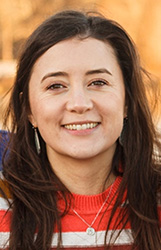Engineering Novel Switch Receptors to Advance Cell Therapy
Switching the function of receptors for CD47, FasL and other targets to stimulate rather than suppress T cells
Technology Overview
 Dr. Shannon Oda
Dr. Shannon Oda
The potential to treat cancer with adoptive cell therapy (ACT), including chimeric antigen receptor (CAR) T-cell therapy, is limited by suppressive elements of the tumor microenvironment. Inhibitory cells, cytokines and chemokines limit ACT efficacy by interfering with signals that T cells require for activation, leading to T cell inhibition and cell death.
Cancer immunotherapy researcher Shannon Oda, PhD, develops new technologies — such as fusion proteins called transform switch receptors (TSRs) — to empower ACT to overcome obstacles such as T cell suppression. The Oda team creates TSRs by exchanging inhibitory domains of T cell transmembrane proteins for stimulatory domains. This strategy replaces the brakes on T cells with accelerators, rewiring inhibition or death signals to promote proliferation, antitumor activity and persistence.
The Oda lab's first-ever studies on TSRs with novel endodomains show they can outperform known technologies, including those that include the 4-1BB domain, a T cell survival-enhancing signal. A TSR that binds the cell death signal FasL but is engineered to instead send a prosurvival signal entered a phase I clinical trial in 2024 for patients with advanced or metastatic solid tumors.
Dr. Oda is optimizing the TSR approach to improve therapeutic outcomes in acute myeloid leukemia (AML), sarcomas, central nervous system tumors and pancreatic tumors. As FasL is a universal inhibitory mechanism, this work could potentially extend to tailored treatment of any cancer and to development of off-the-shelf immunotherapies.
Dr. Oda has a library of TSRs that can:
- Increase T cell persistence and proliferation with continuous activation signals. This extends T cell survival and ensures multiplication in the hostile tumor microenvironment.
- Enhance antitumor activity using signals to boost identification and elimination of cancer cells.
- Promote robust cytokine production that coordinates a stronger overall immune response against the tumor.
The Oda Lab has additional strategies to supercharge T cells and overcome other immunotherapy barriers. They are engineering T cell transmembrane proteins into a new class of fusion proteins called dual costimulatory receptors (DCRs) that boost T cell metabolism, activation, proliferation, cytokine production and concentration in tumors and also promote antitumor functions of the ACT recipient's own immune system.
Dr. Oda's expertise includes developing rigorous assays and screening protocols using human primary cells and conducting in vivo studies with immunocompetent animal models. Her experience includes human clinical trials and industry partnerships. She is interested in collaborations to develop engineering strategies to advance cancer immunotherapy.
Stage of Development
- Preclinical in vitro
- Preclinical in vivo
Partnering Opportunities
- Collaborative research opportunity
- Sponsored research agreement
- Consultation agreement
- Licensing agreement
Publications
- Anderson KG, Oda SK, Bates BM, et al. Engineering adoptive T cell therapy to co-opt Fas ligand-mediated death signaling in ovarian cancer enhances therapeutic efficacy. J Immunother Cancer. 2022;10(3):e003959.
- Oda SK, Anderson KG, Ravikumar P, et al. A Fas-4-1BB fusion protein converts a death to a pro-survival signal and enhances T cell therapy. J Exp Med. 2020;217(12):e20191166.
- Oda SK, Daman AW, Garcia NM, et al. A CD200R-CD28 fusion protein appropriates an inhibitory signal to enhance T-cell function and therapy of murine leukemia. Blood. 2017;130(22)2410-2419.
- Anderson KG, Voillet V, Bates BM … Oda SK, et al. Engineered adoptive T-cell therapy prolongs survival in a preclinical model of advanced-stage ovarian cancer. Cancer Immunol Res. 2019;7(9):1412-1425.
